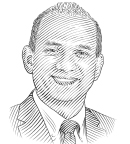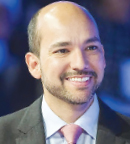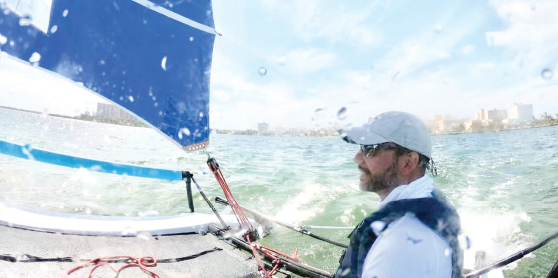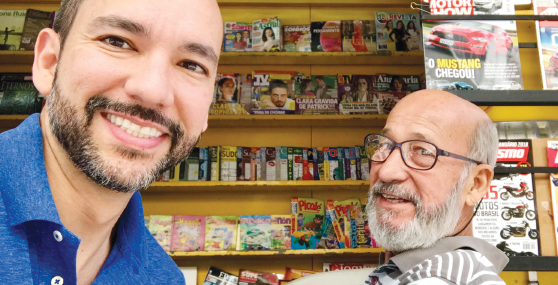GUEST EDITOR

Jame Abraham, MD, FACP
Dr. Abraham is the Director of the Breast Oncology Program at Taussig Cancer Institute, and Professor of Medicine, Lerner College of Medicine, Cleveland Clinic.
For this installment of the Living a Full Life series, Guest Editor Jame Abraham, MD, FACP, spoke with Gilberto de Lima Lopes, Jr, MD, MBA, FAMS, a medical oncologist who is Medical Director for International Programs and Associate Director for Global Oncology at the Sylvester Comprehensive Cancer Center, and Associate Professor of Clinical Medicine at the University of Miami in Florida. He returned to the United States after 10 years in Asia and Latin America and has dedicated much of his time to the issues of cancer control and access to medications in low- and middle-income countries.

Gilberto de Lima Lopes, Jr, MD, MBA, FAMS
Illness was a frequent theme in the early life of Dr. Lopes, which is one reason that he began thinking about pursuing a career in medicine. “My grandfather died of a glioma when my father was 14 years old, and my grandmother died of breast cancer when my mother was 18, and that left a strong impression on him, which also affected my early decision to become a doctor and do cancer research. During medical school, my first mentor, Dr. Sergio Azevedo, was an oncologist and the kind of doctor you aspire to become. In fact, when I told him he was the single most influential person in my decision to become an oncologist, it actually brought tears to his eyes, although I doubt he’d admit to that in public,” Dr. Lopes noted.
Gilberto de Lima Lopes, Jr, MD, MBA, FAMS
On the William J. Harrington Program: “That experience really firmed up my belief that as oncologists, we can achieve great goals in clinical care, research, and teaching.”
On the ASCO Breakthrough meeting: “The general idea is to move away from our silos and see how we can learn from global collaboration.”
On being an oncologist: “I love what I do and cannot imagine another career. That said, this is a very demanding and time-consuming profession, so it is also important to have ways to decompress.”
“I worked with Sergio throughout medical school and did an extra month when he was attending on the wards. Then I worked for 3 years in his oncology clinic, which was an experience that gave me a very strong tie to the politics of health care,” he continued.
“My second mentor, Dr. Gilberto Schwartsmann, was in translational medicine. He founded the South American Office for Anti-Cancer Drug Development in Brazil. I got my first grant from the Brazilian Research Council while working in Gilberto’s lab. We screened natural products, such as roots and leaves from the Amazon rainforest, to determine if they possessed any anticancer activity. We actually created homogenic solutions from these items and tested them in the standard National Cancer Institute (NCI) panel. It was a wonderful learning experience,” he said.
Beginning of a Global Oncology Career
Dr. Lopes noted that both mentors instilled in him the desire to expand his training outside of Brazil. As a fifth-year medical student, he came to the United States and joined the William J. Harrington Medical Training Program, which offers internships and residencies to Latin American medical graduates through the University of Miami School of Medicine’s program at Jackson Memorial Hospital.
“There are 12 slots in internal medicine, and after finishing the program, you are supposed to return and practice medicine for a few years in your country of origin,” he explained. “The program has been active for 50 years. That experience firmed up my belief that as oncologists, we can achieve great goals in clinical care, research, and teaching. It also cemented my idea to return to the United States for my postgraduate work.”
A Father’s Guidance
Dr. Lopes noted that his father was a driving force in his career path. “My father died about 6 months ago of gastric cancer. Even though he never went to college, he was the most significant force through my life and career choices. During high school, I was interested in pursuing a career in biology, but my father convinced me that medicine was a profession in which I would be involved in vulnerable people’s lives in a way that would give me personal gratification. Plus, I would be able to do research, which would satisfy my love of biology. So at the age of 15, with my father’s guidance, I made the decision to become a doctor.”

Dr. Lopes enjoys sailing and uses this time as an opportunity to decompress from his very busy schedule.
Dr. Lopes explained that for the last 35 years of his father’s life, his father owned and ran a newsstand a block away from where was atteending medical school. “This was a very interesting life experience, something I always open my talks with when I lecture in my medical school in August. I show a picture of his newsstand, often wondering how many people knew him on a day-to-day basis. It’s a wonderful life story, and his total commitment to his children’s education—I have a brother who is a lawyer and a sister who is a speech therapist—was so unselfish; it shaped our lives,” said Dr. Lopes.
In 1999, after finishing his residency in Brazil, largely because of his participation in the W.J. Harrington Training Program in Miami, Dr. Lopes applied for and was accepted to an internship at the University of Miami in Florida. “After 3 years of an internal medicine residency and a year as Chief Resident, I began my hematology/oncology fellowship at the University of Miami. During my fellowship, I had a great mentor in Dr. Caio Rocha Lima, who taught me pretty much everything I needed to know about designing and runninging phase I through III clinical trials and how to do translational research. He actually gave me as much responsibility as I could handle, and I always tell my residents and fellows to take on as much responsibility as possible, because that’s the way you truly learn.”
A Team Sport
The other lesson gleaned from Dr. Rocha Lima was that oncology is a team sport. “He told me that you don’t really accomplish anything by yourself, and thanks to that advice, I truly learned how to create networking relationships and give credit where credit’s due. I also learned how to help others in their career paths. All of these things together have helped me accomplish a lot in a short amount of time.”

Dr. Lopes with his father, at the newsstand in Brazil that his father owned and managed for 35 years. This was located just a block from where Dr. Lopes attended medical school. Dr. Lopes’ father was a driving force in his son’s life and career path.
During his time at the University of Miami, Dr. Lopes had a J-1 visa, which is issued to visitors participating in programs that promote cultural exchange, especially to obtain medical or business training. After his fellowship, he was supposed to return to Brazil unless he could find a waiver position in the United States. “Despite my years of training, I still felt I didn’t have enough knowledge and experience to truly make a difference in Brazil if I returned. Therefore, I looked around for waiver programs in the United States and opportunities abroad and was offered a position in Singapore. My wife is Coasta Rican–Chinese, and she had always had a curiosity about living in Asia, so we accepted. During my interview in Singapore, we both liked the culture, so I accepted the position,” said Dr. Lopes.
From 2006 to 2013, Dr. Lopes worked for the Johns Hopkins Singapore International Medical Centre. “Because we were a relatively small outfit, I ran all of the solid tumor trials we brought in, and I was able to collaborate with researchers around the world. In Brazil, I grew up during a time of transition from a dictatorship to democracy, and I saw a transformation in access to health care, especially during the AIDS epidemic. That experience truly instilled an interest in public health service.”
Dr. Lopes explained that in Singapore, patients pay significant proportions of their health care out-of-pocket and through health savings accounts and are therefore conscious of the cost of chemotherapy regimens, questioning the price and effectiveness of each agent. “Seeing the access-to-care struggle in Brazil and the issue of cost vs value in Singapore, I fell in love with public health. That is when I went back to school for my MBA with a focus on economics, learning how to work with economic models and research in health-care quality and policy as well. That launched my parallel career in global oncology. And ASCO has had a significant role in this movement, with former presidents and colleagues leading the way.”
In 2015, the University of Miami hired a new President, Julio Frenk, former Dean of the Harvard T.H. Chan School of Public Health. According to Dr. Lopes, he was keen on expanding the University’s reach into Latin America. “So, the cancer center followed President Frenk’s lead and created my position as Associate Director for Global Oncology, and gave me start-up funding so we could create a program. We presented this in our core grant to the NCI, which allowed us to become Florida’s second designated comprehensive cancer center. This is another exciting part of my journey in oncology that has taken me to so many exciting places and opportunities around the world,” said Dr. Lopes.
Collaboration Is Key
In addition to delivering lectures around the world, Dr. Lopes has been Principal Investigator, Co-Principal Investigator, or Steering Committee Member for more than 100 studies and clinical trials covering breast, gastrointestinal, genitourinary, and thoracic cancers. “I’m currently co-leading our thoracic disease group, in which we deal clinically with all thoracic malignancies. I was very lucky to be Principal Investigator on the KEYNOTE-042 trial, which was the largest standalone trial of pembrolizumab, and I was honored to present the findings at the 2018 ASCO Annual Meeting Plenary Session. We continue to rigorously investigate new biomarkers to help us predict responses to immune checkpoint inhibitors, including pembrolizumab,” commented Dr. Lopes.
The most important advice I ever received was to treat oncology as a team sport—make friends, collaborate, and share.— Gilberto de Lima Lopes, Jr, MD, MBA, FAMS
Tweet this quote
In October, ASCO is convening a new meeting in Bangkok, Thailand, titled Breakthrough: A Global Summit for Oncology Innovators. This meeting is focused on the intersection of medicine, scientific discovery, and innovations in technology. “I’m excited about my role in the Breakthrough meeting. It will give us at ASCO the opportunity to partner with the Thai Society of Clinical Oncology and collaborate with colleagues from around the world tohelp bring together a host of stakeholders—not just oncologists, but anybody involved in innovative ways to better care. The general idea is to move away from our silos and see how we can learn from global collaboration. We have a number of distinguished speakers from academia, government, industry, and tech,” said Dr. Lopes.
According to Dr. Lopes, social media is a key component to the global oncology initiative. Before becoming Editor-in-Chief of ASCO’s Journal of Global Oncology in 2017, he served as Social Media Editor for the journal.
“Social media gives us the tools to be able to connect globally in real time and develop working relationships that truly advance the quality of care. Twitter is probably the most used of the social media in oncology, but all forms of this innovative technology are useful to maintain connectivity and share the latest advances from meetings that you might not have been able to attend,” he said.
Decompress and Disconnect
How does a super-busy global oncologist balance a demanding career with personal life? “Balance in life begins with family, so I make an effort to maintain a close relationship with family members both here in the United States and back in Brazil. I love what I do and cannot imagine another career. That said, this is a very demanding and time-consuming profession, so it is also important to have ways to decompress. I run several times a week, swim, and play soccer with a group from the hospital. I also enjoy sailing and skeet shooting. I highly recommend setting a time period during which you don’t take phone calls or check social media. I usually do that when I sail. It’s a great way to clear your head.”
Dr. Lopes offered a closing thought: “As I mentioned, the most important advice I ever got was to treat oncology as a team sport—make friends, collaborate, and share. It will make your experience in this great field even more rewarding.” ■
DISCLOSURE: Dr. Lopes has received honoraria from Boehringer Ingelheim; has served in a consulting or advisory role for AstraZeneca and Pfizer; has received personal or institutional research funding from AstraZeneca, Bavarian Nordic, Blueprint Medicines, EMD Serono, G1 Therapeutics, Merck Sharp & Dohme, Novartis, and Tesaro; and has been reimbursed for travel, accommodations, or other expenses by Boehringer, E.R. Squibb & Sons, Janssen, and Pfizer.

